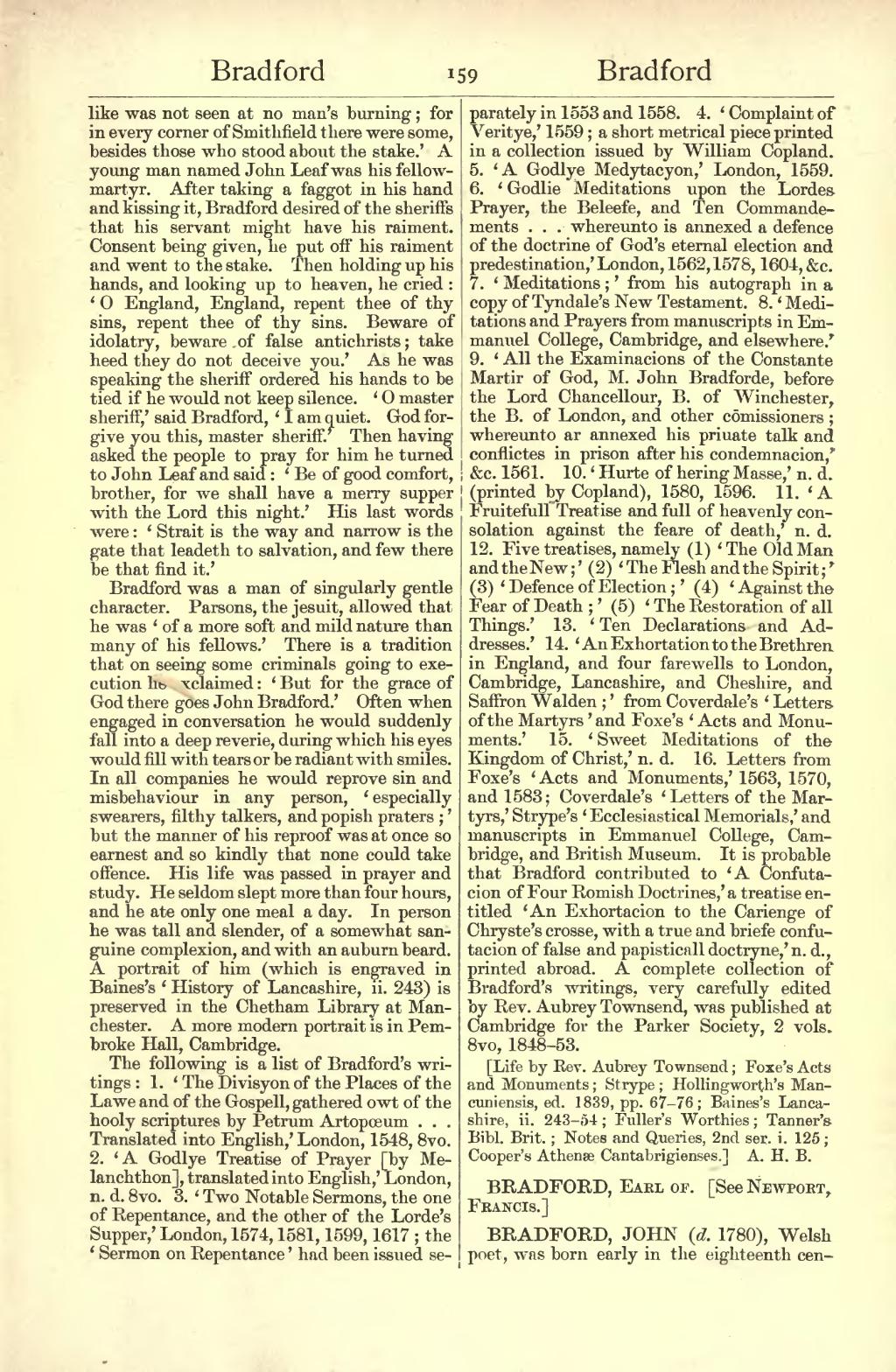like was not seen at no man's burning; for in every corner of Smithfield there were some, besides those who stood about the stake.' A young man named John Leaf was his fellow-martyr. After taking a faggot in his hand and kissing it, Bradford desired of the sheriffs that his servant might have his raiment. Consent being given, he put off his raiment and went to the stake. Then holding up his hands, and looking up to heaven, he cried: 'England, England, repent thee of thy sins, repent thee of thy sins. Beware of idolatry, beware of false antichrists; take heed they do not deceive you.' As he was speaking the sheriff ordered his hands to be tied if he would not keep silence. 'O master sheriff,' said Bradford, 'I am quiet. God forgive you this, master sheriff.' Then having asked the people to pray for him he turned to John Leaf and said: 'Be of good comfort, brother, for we shall have a merry supper with the Lord this night.' His last words were: 'Strait is the way and narrow is the gate that leadeth to salvation, and few there be that find it.'
Bradford was a man of singularly gentle character. Parsons, the Jesuit, allowed that he was 'of a more soft and mild nature than many of his fellows.' There is a tradition that on seeing some criminals going to execution he exclaimed: 'But for the grace of God there goes John Bradford.' Often when engaged in conversation he would suddenly fall into a deep reverie, during which his eyes would fill with tears or be radiant with smiles. In all companies he would reprove sin and misbehaviour in any person, 'especially swearers, filthy talkers, and popish praters;' but the manner of his reproof was at once so earnest and so kindly that none could take offence. His life was passed in prayer and study. He seldom slept more than four hours, and he ate only one meal a day. In person he was tall and slender, of a somewhat sanguine complexion, and with an auburn beard. A portrait of him (which is engraved in Baines's 'History of Lancashire, ii. 243) is preserved in the Chetham Library at Manchester. A more modern portrait is in Pembroke Hall, Cambridge.
The following is a list of Bradford's writings:
- 'The Divisyon of the Places of the Lawe and of the Gospell, gathered owt of the hooly scriptures by Petrum Artopœum … Translated into English,' London, 1548, 8vo.
- 'A Godlye Treatise of Prayer [by Melanchthon], translated into English,' London, n. d. 8vo.
- 'Two Notable Sermons, the one of Repentance, and the other of the Lorde's Supper,' London, 1574, 1581, 1599, 1617; the 'Sermon on Repentance' had been issued separately in 1553 and 1558.
- 'Complaint of Veritye,' 1559; a short metrical piece printed in a collection issued by William Copland.
- 'A Godlye Medytacyon,' London, 1559.
- 'Godlie Meditations upon the Lordes. Prayer, the Beleefe, and Ten Commandements … whereunto is annexed a defence of the doctrine of God's eternal election and predestination,' London, 1562,1578, 1604, &c.
- 'Meditations;' from his autograph in a copy of Tyndale's New Testament.
- 'Meditations and Prayers from manuscripts in Emmanuel College, Cambridge, and elsewhere.'
- 'All the Examinacions of the Constante Martir of God, M. John Bradforde, before the Lord Chancellour, B. of Winchester, the B. of London, and other comissioners; whereunto ar annexed his priuate talk and conflictes in prison after his condemnacion,' &c. 1561.
- 'Hurte of hering Masse,' n. d. (printed by Copland), 1580, 1596.
- 'A Fruitefull Treatise and full of heavenly consolation against the feare of death,' n. d.
- Five treatises, namely (1) 'The Old Man and the New;' (2) 'The Flesh and the Spirit;' (3) 'Defence of Election;' (4) 'Against the Fear of Death; ' (5) 'The Restoration of all Things.'
- 'Ten Declarations and Addresses.'
- 'An Exhortation to the Brethren in England, and four farewells to London, Cambridge, Lancashire, and Cheshire, and Saffron Walden;' from Coverdale's 'Letters of the Martyrs' and Foxe's 'Acts and Monuments.'
- 'Sweet Meditations of the Kingdom of Christ,' n. d.
- Letters from Foxe's 'Acts and Monuments,' 1563, 1570, and 1583; Coverdale's 'Letters of the Martyrs,' Strype's 'Ecclesiastical Memorials,' and manuscripts in Emmanuel College, Cambridge, and British Museum. It is probable that Bradford contributed to 'A Confutacion of Four Romish Doctrines,' a treatise entitled 'An Exhortacion to the Carienge of Chryste's crosse, with a true and briefe confutacion of false and papisticall doctryne,' n. d., printed abroad.
A complete collection of Bradford's writings, very carefully edited by Rev. Aubrey Townsend, was published at Cambridge for the Parker Society, 2 vols. 8vo, 1848-53.
[Life by Rev. Aubrey Townsend; Foxe's Acts and Monuments; Strype; Hollingworth's Mancuniensis, ed. 1839, pp. 67-76; Baines's Lancashire, ii. 243-54; Fuller's Worthies; Tanner's Bibl. Brit.; Notes and Queries, 2nd ser, i. 125; Cooper's Athenæ Cantabrigienses.]
BRADFORD, Earl of. [See Newport, Francis.]
BRADFORD, JOHN (d. 1780), Welsh poet, was born early in the eighteenth cen-
